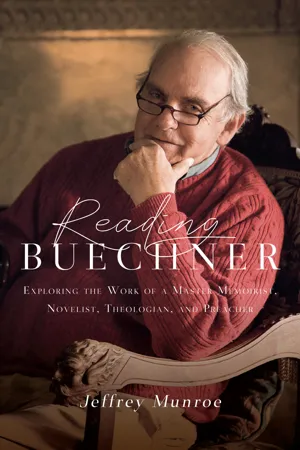IN 1992, FREDERICK BUECHNER and Maya Angelou appeared together for a series of lectures sponsored by the Trinity Institute. Buechner opened, telling about his upper-class, Ivy League childhood that was disrupted by his father’s suicide. Next the emcee introduced Angelou, noting that she couldn’t be more different from Buechner. Not only was she an African American woman, but her roots in abject poverty in the deep South would make her story a far cry from the one they had just heard. As he said this, Angelou shook her head from side to side. When she reached the microphone, she said that he was wrong, noting, “I have exactly the same story to tell as Frederick Buechner.”1
Buechner was delighted, because her words affirmed one of his core convictions, stated in the preface of The Sacred Journey: “The story of any one of us is in some measure the story of us all.”2 Each of us has a particular story—and the particular elements of Buechner’s story couldn’t be more different from the particular elements of Angelou’s. But what elements of each particular story are true for all of us? Truly telling our human experiences make particular stories universal because, as the old saying puts it, what goes deepest to the heart goes widest to the world.
The power of “story” has become so ubiquitous the term is almost a cliché. But our stories are significant: stories serve as both windows to see the world through and mirrors in which we see ourselves. They function for good or for ill. “We are our stories,” Rebecca Solnit writes, “stories that can be both prison and the crowbar to break open the door of that prison.”3 Stories feed what the poet Wallace Stevens called “the necessary angel” of imagination,4 and sharing our story safely has life-giving, life-changing, and life-saving capacity.
Spiritual memoirs aren’t new; perhaps the first was Augustine’s Confessions, written some 1,600 years ago. But lately the number of story-driven spiritual memoirs has increased exponentially. Maybe they are a result of the narcissism of our age, when so many of us seem to live our lives publicly through social media. But is there more going on? The same technological advances that make it possible to live on Facebook, Twitter, and Instagram have made the world staggeringly complex. We find help navigating our way through life’s challenges via the open and honest sharing of others. Great memoirs, like great novels, become equipment for living.
Spiritual memoirs feel necessary in this cultural moment, and Frederick Buechner is the godfather of today’s spiritual memoir movement. He first opened the ground in 1982 with The Sacred Journey. The novelist Reynolds Price, writing in the New York Times Book Review, called the book “a beautifully successful experiment.”5 No one would call a spiritual memoir an “experiment” today. Buechner was a forerunner, and he stands as an inspirational source for many of today’s practitioners of the art. The spiritual memoirist Anne Lamott calls him “America’s most important living theologian” and “a brilliant, lovely religious thinker with a great sense of humor, and a first class writer.”6
The Sacred Journey started an avalanche. It was different from autobiographies of the time—it focused on Buechner’s internal spiritual development instead of external accomplishments. If Buechner had written it as a typical memoir of the time, it would have been about his development as a writer and would have culminated with the stunning success of his novel A Long Day’s Dying in 1950, when Buechner was only twenty-three. Instead, the focus of The Sacred Journey is on the events that led to Buechner’s embrace of Christianity (which was not predictable, since he’d grown up in a family that had no real interest in church or matters of faith) and enrollment in seminary when he was twenty-seven.
As we explore The Sacred Journey, I’ll include many of the particulars of Buechner’s biography contained in the book while contemplating the deeper, universal truths of those particulars. I’ve also added some additional biographical information that helps shed light on Buechner’s development.
The book’s first line echoes a line used a dozen years earlier in Buechner’s The Alphabet of Grace that suggests in essence all theology, like all fiction, is autobiographical.7 It’s a point that makes some theologians bristle because it smacks of subjectivity. (Others hear John Calvin’s assertion that there is no knowledge of God without knowledge of self.)8
As Anne Lamott says, Buechner is a theologian, but he does not structure his thoughts or writing like a typical theologian. He does not put forth a series of propositional truths, and he deals more in doubt than certainty. What matters most is the experience of God’s presence, not the objective proof of God’s existence; Buechner contends in several places that presence, not proof, is the miracle we’re after. This is a cornerstone of his theology. Revelation is personal: if God speaks at all, he speaks into our personal lives, and all systems of theology start first as personal experience.
Since God’s Word is spoken into our lives, his Word is always an incarnate Word subject to misinterpretation and misunderstanding. This makes it a risky business to interpret the meaning of life events, to think we know what God is up to and what he might be saying to us. Yet Buechner believes there are connections that run through the seemingly random occurrences of our lives; he believes patterns emerge and meaning is suggested when we pay attention and listen to our lives. The issue isn’t so much what happens but what matters. What meaning do we make of it? As Buechner lays this out in the preface of The Sacred Journey, he raises the question of what God might be saying through a good person’s suicide, foreshadowing the key event on which this book (and in many ways his life) will turn. Although suicide references abound in Buechner’s work, The Sacred Journey is the first of his books that plainly tells the story of that fateful day in Essex Falls, New Jersey, in November 1936, when Buechner’s father sat on the running board of an automobile and breathed in the carbon monoxide that killed him. It’s not a stretch to say Buechner’s life and career have been a quest to understand the meaning of that event and to understand where God was when the unthinkable happened. At least one possible answer comes through in The Sacred Journey: although Buechner was far from God at that point in his young life, the healing that came immediately after that traumatic event was pure gift, eventually raising the thought inside Buechner that if there was a gift, then a giver was also implied. Buechner does not believe God orchestrated the event but also doesn’t believe God was absent. Buechner’s assertion is that somehow, even when things seem bleakest, God’s grace is still an active force in our lives and world.
Carl Frederick Buechner was born into privilege in New York City on July 11, 1926. There was wealth in the family, particularly from his paternal great-grandfather, Hermann Balthazar Scharmann, a brewer and real estate magnate. The first section of The Sacred Journey is titled “Once Below a Time,” borrowing the phrase from Dylan Thomas, and “below time” becomes a way of describing that childhood experience of existence when time is something measured “by its content rather than its duration.”9 During this almost magical early part of his life, there is no particular narrative to be told, no events that need relaying to move the action forward. Buechner was a sensitive, bookish child, prone to spending as much time in the fantasy land of Oz as in the frequently difficult reality of his home, where his parents often argued loudly. He provides memorable descriptions of the people who filled his life, and because his family moved almost every year, it was these people rather than a house or location that constituted his true home.
The giants of his childhood were his two grandmothers. Grandmother Buechner, who lived with her husband in an apartment twelve floors above Park Avenue, was a large woman who comes off in the book as a bit of a blunt instrument as she controls the family purse strings and freely shares her opinions. Buechner’s maternal grandmother, Antoinette Golay Kuhn, whom he nicknamed Naya, stands tallest in this book and in Buechner’s formation. Naya is a person teeming with sophistication, imagination, and energy, a life force, and a wonderful storyteller. It is fair to surmise she was a primary source of Buechner’s own great imagination: “She loved Chesterfield cigarettes and the novels of Jean Ingelow and a daiquiri before dinner and crossword puzzles and she spoke the English language with a wit and eloquence and style that I have never heard surpassed.”10 Loosely Unitarian, it would be Naya to whom Buechner would dedicate his first novel, and Naya whom he would write into that novel as an old woman named Maroo. Naya would return as a muse throughout Buechner’s writing career.
Far less light is shed on either Buechner’s mother or father in The Sacred Journey. Writing some forty-five years after his father’s suicide, Buechner’s memories of his father are inconsistent. He writes that he can no longer remember what his father looked like, and when he works to bring his father back, he remembers more what others have said about him than his own recollections. He’d heard that his father was kind and gentle, a strong swimmer, and a good dancer. His father had befriended Scott and Zelda Fitzgerald when they were students at Princeton, and although he was from an elite family, he struggled to make it in business—any business—after college. His lack of success was complicated by the Great Depression, but not entirely so. He went in for foolish get-rich-quick schemes, and he also had more than economic troubles. There were big problems when his parents started drinking cocktails—and they drank a lot of cocktails. Fights and strong accusations followed (most of this is left out of The Sacred Journey). Buechner’s father moved from job to job, and for the first fourteen years of his life, the Buechners moved often, trying to find the right place and right job for his father.
Buechner’s mother, Katherine, was still alive when The Sacred Journey was published. He mostly leaves her out of this account of his life. She could be wonderful and difficult, and more light is shed on her and Buechner’s childhood in Telling Secrets and The Wizard’s Tide, published after her death. In The Wizard’s Tide he describes navigating his childhood as “a little like piling toothpicks on top of a bottle. If you weren’t very careful about the way you did it, the whole works would fall apart and go tumbling.”11 He captures the dysfunction in his family of origin plainly in Telling Secrets:







